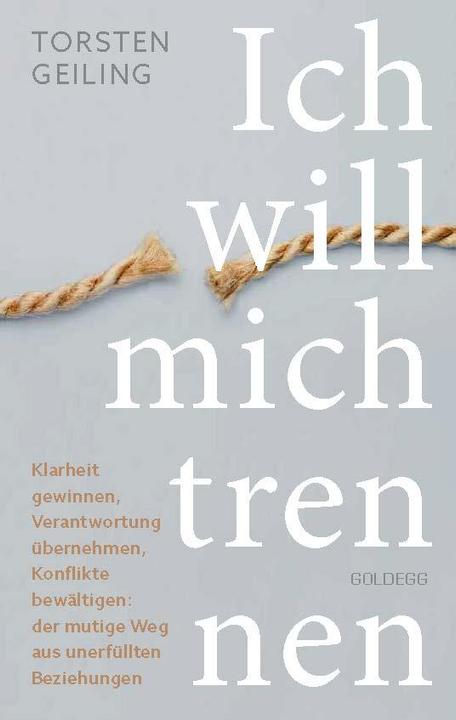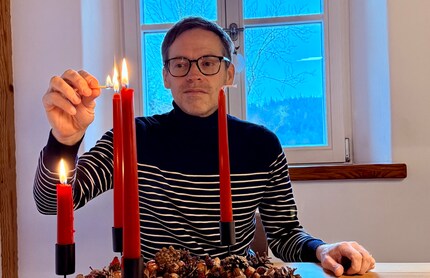

"Christmas is the perfect setting in which hidden conflicts can lead to separation"
For many couples, Christmas is an "emotional endgame". That's what separation counsellor Torsten Geiling says in an interview. He warns against setting expectations too high for the festive season.
He should know. Torsten Geiling went through a break-up himself many years ago - and has made his new profession out of the experiences of that time and many further training courses. Together with his new partner, he works as a systemic coach and supports employees who want to separate in individual coaching sessions. The communication scientist and journalist has also written a book on the topic.

Torsten, is Christmas good for your business?
After the festive season, we do indeed regularly see a significant increase in enquiries for advice. But this is not a purely subjective impression: sociologists from the University of Washington found in a study that holidays are a relationship killer. In the USA, married couples often file for divorce after the summer and winter holiday periods.
And here?
The results are probably similar in Switzerland, Germany and Austria. And if business is good, that's great of course, but it doesn't make me happy - on the contrary. I know that behind every one of these enquiries is a person in a deep personal crisis.
Why are relationships at risk of ending after Christmas?
The festive season has a special dynamic. They often ruthlessly reveal what can still be covered up in everyday life. Many couples who have grown apart can still avoid each other between work and hobbies. This is no longer possible at Christmas. Added to this are the high expectations of the "festival of love" - many secretly hope that spending time together will miraculously save their relationship. This expectation is usually bitterly disappointed.
Is visiting the parents or parents-in-law also a stress factor?
Absolutely. Family dynamics can exacerbate an already tense situation. You only have to imagine: Different expectations, traditions and needs come together in a very small space. This is the perfect breeding ground for conflict. Renowned couples therapist John Gottman has shown in his research that around 69 per cent of all relationship conflicts are based on fundamental personality differences. These become particularly apparent during the intensity of the festive season. However, the holidays are not the reason for the imbalance in a relationship - this often lies weeks, months or even years in the past. The emotional endgame, so to speak, takes place at Christmas.
If almost 70 per cent of all conflicts are hidden in personality differences, then we are helplessly at their mercy ...
On the contrary, this realisation can be very liberating. It shows us that it is normal and okay for us to be different. We don't have to "solve" every conflict or mould a partner in our image.
But?
What matters is how we deal with these differences. Happy couples don't have fewer conflicts - they have learnt to accept them and even see them as an enrichment. If one partner is very structured and the other spontaneous, this can strain or enrich a relationship. Perhaps the structured one provides stability, while the spontaneous one brings more liveliness.
So differences as an opportunity, right?
Yes, in my counselling I often find that differences only become a problem when people stop talking respectfully about their partner. Or when they try to change the other person instead of accepting the differences as part of the relationship.

Source: Lisa Jahns
So what can couples do if they are in crisis but don't want to separate yet?Firstly, it is important to understand that conflict is normal. The aim is not to achieve perfect harmony, but to find a constructive way of dealing with differences. When clients come to me for coaching and say that we never argue, that makes me prick up my ears.
Why?
Because it's a serious problem in many partnerships: many people put off long overdue discussions for years. If we said much sooner what we want, what our boundaries are and where our pain points are, then there wouldn't be so many break-ups. So, let's argue!
And if one partner does want to break up ...?
Then I think honesty is the best approach - and better sooner than later, even if the timing seems unfavourable. A break-up is almost never a spontaneous decision, but the result of a longer process. The sooner you deal with it openly, the more dignity you and your relationship with your partner will retain.
The question is: do you break up before or even at Christmas? Or do you wait until the holidays? Even if you've already made up your mind.
I often hear this question in my counselling sessions, and yes, it feels unfair. But it's usually based on an understandable desire not to spoil the holidays for anyone - especially the children. The problem is: this avoidance strategy increases the emotional pressure on everyone involved. If you are already sure that you want to separate, it is ultimately more honest to communicate this before the holidays. This gives everyone involved the chance to adjust and deal with it authentically, especially as children realise more than you might think.
How many people who have sought your advice with this concern don't break up after all?
This question is not easy to answer because I only accompany people for part of their life's journey. However, I would say that 15 to 20 per cent of my clients don't take the step of separating for the time being, for a variety of reasons: For example, because they feel they haven't tried everything yet, because they are afraid of the possibility of loneliness or are still struggling with feelings of guilt about letting their partner or children down.
What do you say to these people?
I think it's important that we think of others in such crises. However, many people forget one very important person in such situations: themselves. I like to compare it to a drop in air pressure in an aeroplane. When the oxygen masks fall from the ceiling, there is a clear instruction: "Put on your oxygen mask before you help others." You can only help others and yourself if you treat yourself with care. A relationship also grows by overcoming problems. And these are not the exception, but rather the norm. The decisive factor is therefore not the absence of conflict, but how couples deal with it.
So it's not about staying together at all costs?
No, it's more about making a conscious and honest decision. To do that, I need to know: Who am I actually? Where do I want to go in life? And only then should you ask yourself the question: With whom?
What specific tips do you have for the festive season?
The secret to a successful relationship actually lies in the time between the holidays. A relationship is not a self-runner, it's work. That sounds exhausting. But at the same time, it offers the opportunity to do something independently and perhaps also together for the partnership.
But you wanted to know what else you can do specifically. Here are my most important recommendations for the most relaxed Christmas period possible, in a reader-friendly list.
All right, get started!
- Talk openly about how you want to spend the holidays
- Look together for a way that works for both of you
- You don't have to do every activity together.
- Determine in advance who will visit you, when and for how long.
- Create a buffer between different family appointments
- Consider beforehand what typical conflict triggers are.
- Not every conflict needs to be resolved immediately.
- Sometimes "good enough" really is good enough.
- Develop strategies for critical moments.
- Have the courage to say "no".
And above all: don't put yourself under pressure. Don't act like the perfect family when there's a crisis. This honesty can even have a bonding effect because it takes the pressure off everyone. Christmas doesn't have to be perfect.
Thank you for the interview, Torsten.
Journalist since 1997. Stopovers in Franconia (or the Franken region), Lake Constance, Obwalden, Nidwalden and Zurich. Father since 2014. Expert in editorial organisation and motivation. Focus on sustainability, home office tools, beautiful things for the home, creative toys and sports equipment.
Interesting facts about products, behind-the-scenes looks at manufacturers and deep-dives on interesting people.
Show allThese articles might also interest you

Background information
First world problems: when children don’t know what to wish for
by Michael Restin

Background information
How your intuition can guide you towards better decisions
by Mareike Steger

Background information
Stone Age mattresses, alcohol and pillow favourites - five sleep episodes
by Martin Jungfer